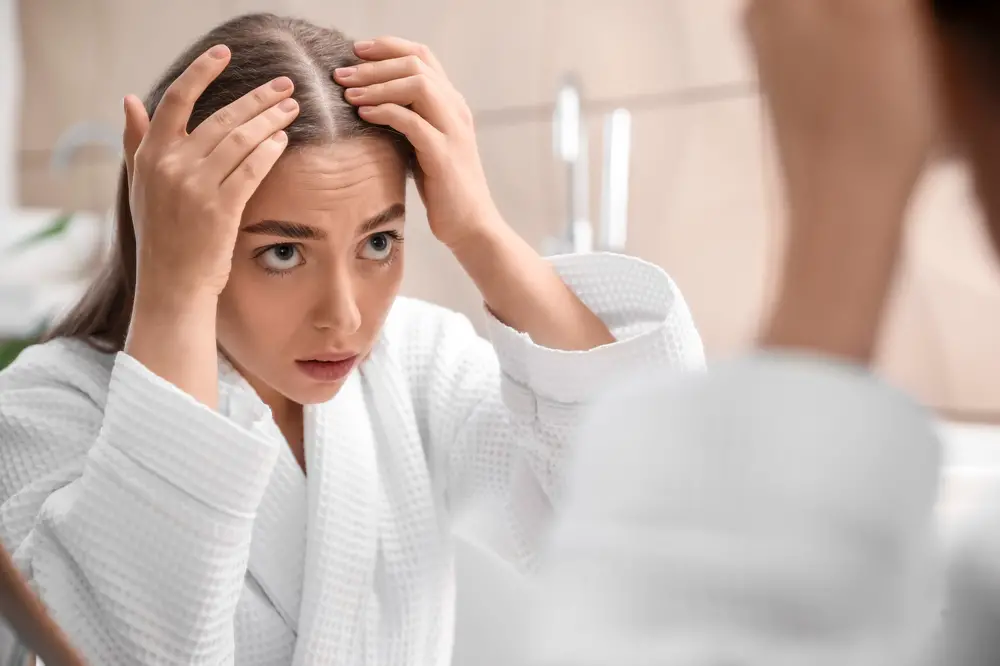We all have beauty routines we swear by, but what if some of those habits are doing more harm than good? From shortcuts we take when we’re too busy to bad advice we didn’t know was outdated, these seemingly small mistakes can negatively impact your skin and overall appearance. It’s not just about the products you use—it’s also about how you use them (and sometimes what you skip entirely). This isn’t about guilt-tripping; it’s about leveling up your beauty game and protecting that gorgeous glow.
1. Overdoing The Exfoliation
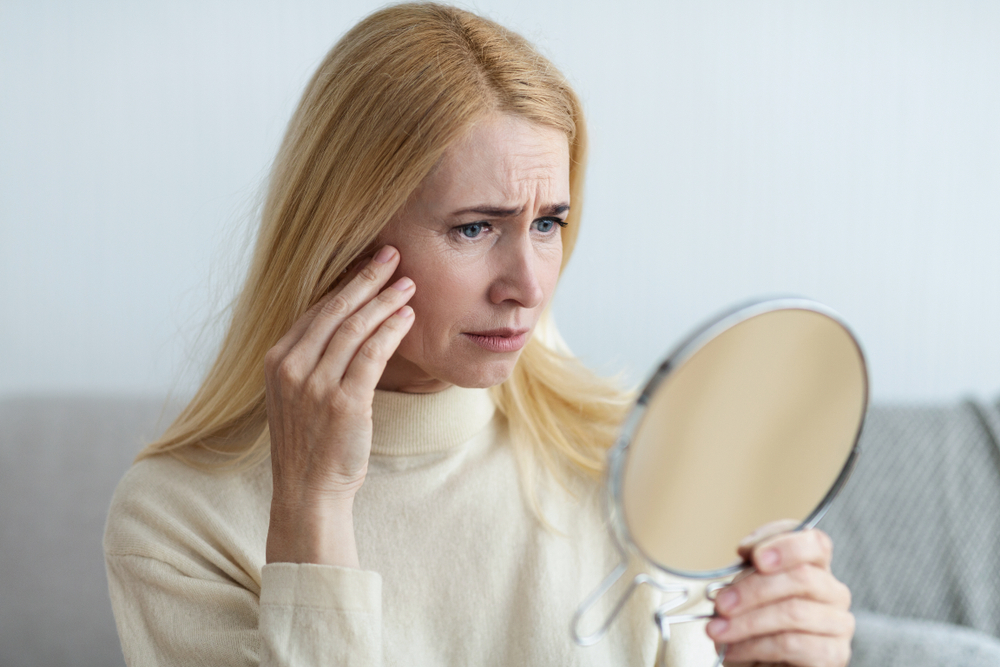
Exfoliation is essential for maintaining smooth, radiant skin, as it removes dead cells and unclogs pores. But too much of a good thing can cause harm—using harsh scrubs or over-exfoliating can damage your skin’s natural barrier. This can lead to irritation, redness, and increased sensitivity, leaving your skin vulnerable to premature aging. Instead of achieving a glow, you might end up with inflamed, raw skin that feels anything but healthy. According to skincare expert Monica Watters, gently exfoliating your skin two times per week is more than enough for most skin types.
If you’re using chemical exfoliants, choose products suitable for your skin type and always follow up with sunscreen. Over-exfoliation can strip your skin of natural oils, triggering excessive dryness or breakouts. Signs that you’re overdoing it include tightness, flakiness, and increased sensitivity. Balance is key—your skin needs time to heal and regenerate between exfoliating sessions. Treat your skin gently to ensure long-term health and beauty.
2. Forgetting To Remove Makeup Before Bed

Sleeping in your makeup is one of the fastest ways to sabotage your skin. Makeup clogs pores, preventing your skin from breathing and healing overnight. This leads to breakouts, dullness, and even premature aging caused by free radical damage. Throughout the day, makeup traps dirt and environmental pollutants, which can seep deeper into your skin if left on overnight. A thorough cleanse, or ideally a double cleanse before bed, can prevent many skin issues, says professional makeup artist Willow Mayor.
Make removing makeup a non-negotiable step in your nighttime routine. Use a gentle makeup remover or cleansing balm to ensure every trace of makeup is gone. Follow it up with a cleanser to remove residual dirt and impurities. Your skin regenerates while you sleep, so give it a clean slate to work with. Not only will your skin thank you, but you’ll also wake up feeling fresher and more radiant.
3. Neglecting Your Cleansing Game
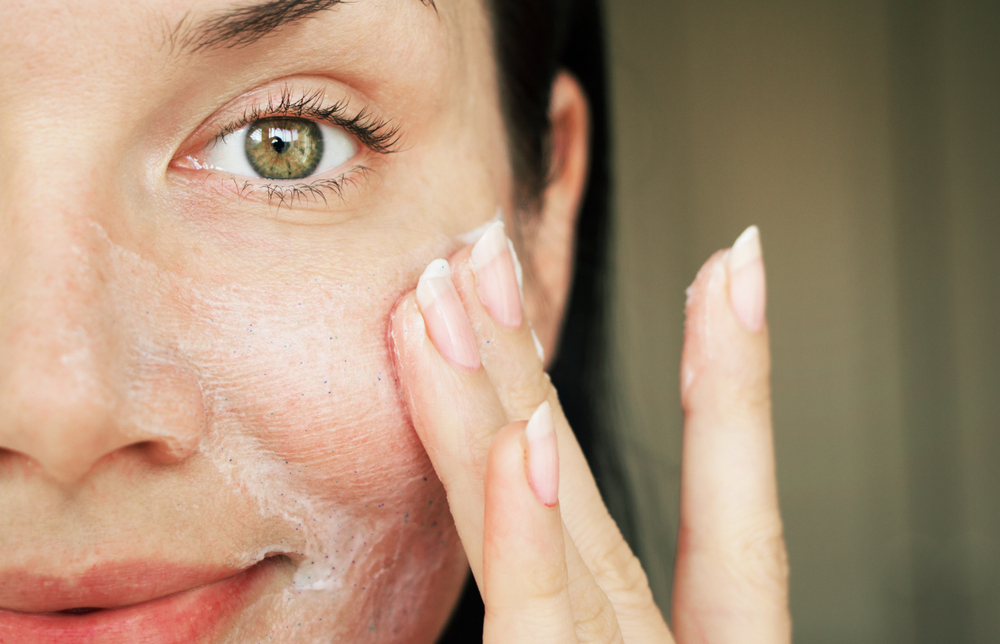
A consistent cleansing routine is the foundation of good skincare. Neglecting to cleanse your face morning and night allows dirt, oil, and bacteria to build up, leading to clogged pores and dull skin. Double cleansing is especially effective for removing makeup and deeply cleaning your skin, ensuring all impurities are washed away. Without proper cleansing, your skincare products won’t absorb effectively, diminishing their benefits. Over time, this neglect can accelerate aging and leave your skin looking tired and uneven.
Cleansing doesn’t have to be complicated—just choose a gentle cleanser that suits your skin type. Use lukewarm water to avoid stripping your skin of its natural moisture. Pat your face dry with a clean towel instead of rubbing, which can cause irritation. Incorporate cleansing into your morning and nighttime routine to maintain a healthy, glowing complexion. Consistency is key to achieving and maintaining radiant skin.
4. Skipping Your Daily Skincare Routine
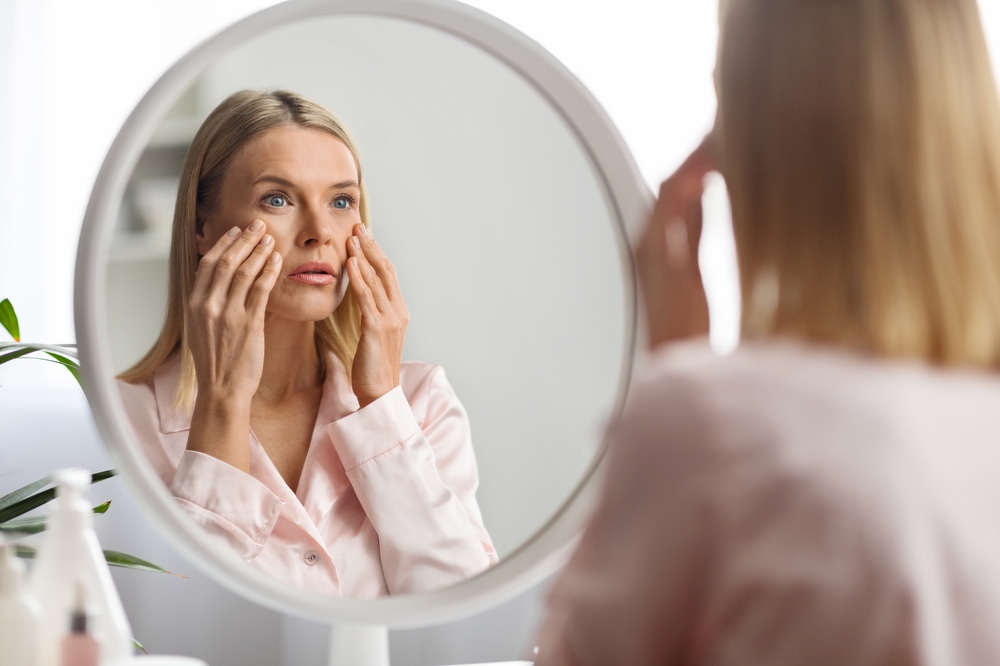
A regular daily skincare routine is essential for maintaining your skin’s health and fighting signs of aging. Skipping steps like moisturizing or applying serum can leave your skin dry, dull, and prone to fine lines. Look to ingredients like vitamin C, hyaluronic acid, peptides, and niacinamide to prevent premature aging, advises cosmetic dermatologist Dr. Carole Hazan. A daily routine of cleansing, hydrating, and protecting your skin is a non-negotiable for achieving a radiant complexion. Neglecting these basics allows damage to accumulate over time, making it harder to reverse later.
Consistency doesn’t have to mean complexity—simple steps can go a long way. Start with a gentle cleanser, followed by a hydrating serum and moisturizer suited to your skin type. Finish with sunscreen in the morning to protect your skin from harmful UV rays. Nighttime is perfect for targeted treatments like retinol or anti-aging serums. Making time for skincare every day ensures long-term benefits and healthier, happier skin.
5. Overlooking Neck Aging
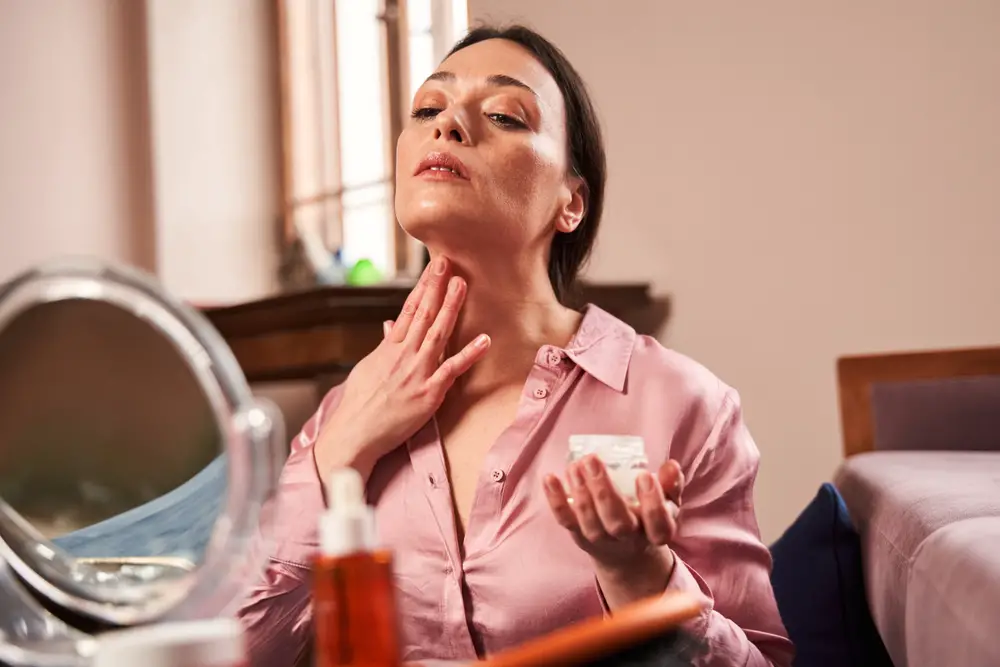
Many women are diligent about an anti-aging skincare routine for their face but forget about their décolletage (the neck and chest area). “The skin on your neck is thinner, dryer, and has less collagen than our face so wrinkles are five times deeper, ” says skin expert Trinny Woodhall, founder of Trinny London which just released The Elevator, a potent antioxidant and plant-based gravity-defying serum for the neck that prevents sagging and strengthens the skin’s elasticity.
Treating your décolletage with the same care as your face prevents premature aging and uneven texture. When applying skincare products, make a habit of extending them down your neck and chest. Use upward motions to combat the effects of gravity and choose products specifically formulated for these delicate areas. Regular exfoliation can also help remove dead skin cells and promote cell turnover. The little extra effort pays off in the long run, keeping your neck and décolletage as radiant as your face. Remember, skincare isn’t just about looking good—it’s about maintaining your confidence and health.
6. Layering On The Oils Thick
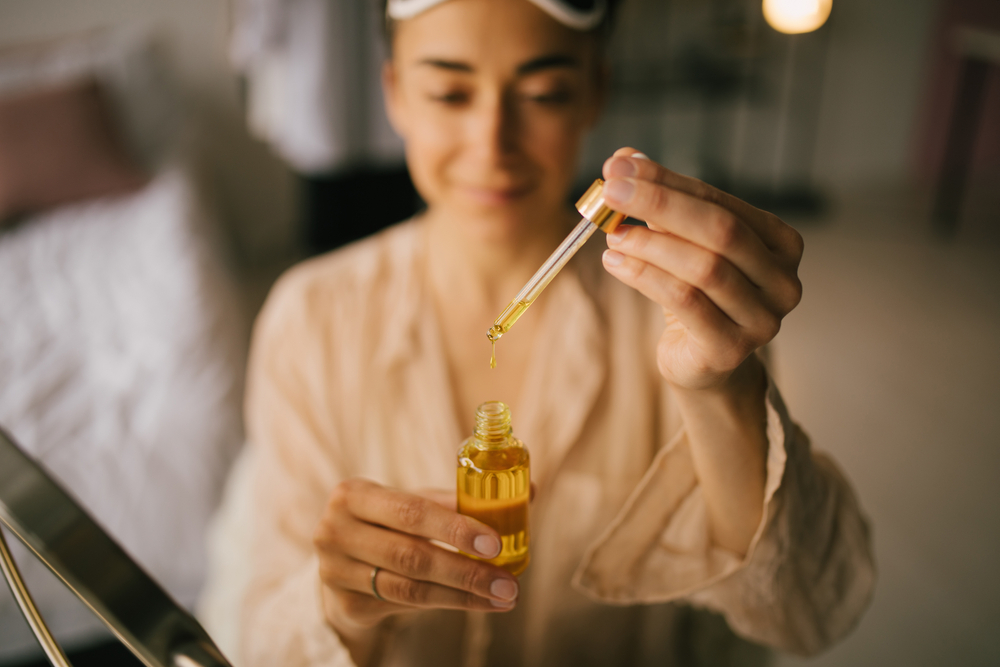
Facial oils can be a great addition to your skincare routine, but too much of a good thing can backfire. While they boost hydration and add a radiant glow, using oils improperly or on unsuitable skin types can clog pores and lead to breakouts. People with oily or combination skin are especially vulnerable to congestion when they overuse oils. Instead of hydrating, excessive oil use can create a greasy layer that traps dirt and bacteria. Knowing your skin type and using oils sparingly is key to getting the benefits without the drawbacks.
If you’re prone to acne or have sensitive skin, opt for non-comedogenic oils like rosehip or jojoba, which won’t clog your pores. Apply just a few drops after your moisturizer to seal in hydration. Avoid layering multiple oils or applying them during the day, as they can make your skin more susceptible to sun damage. Balance is everything—using oils correctly enhances your skincare routine, but overdoing it can cause more harm than good.
7. Slugging Your Skin Too Often
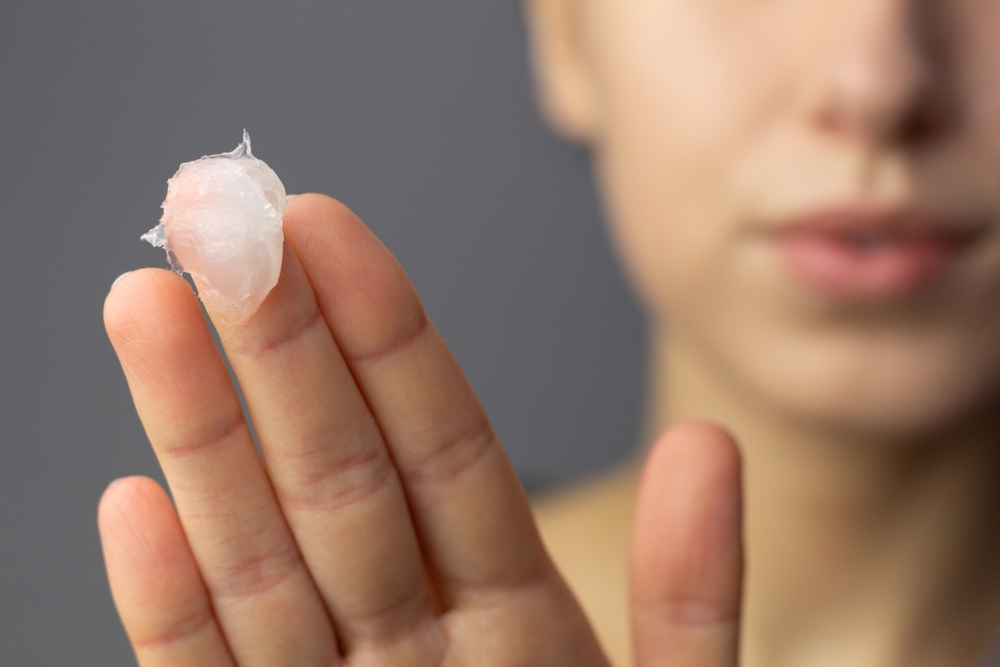
Slugging, or applying an occlusive layer like petroleum jelly to lock in moisture, has taken the beauty world by storm. While it works wonders for dry or damaged skin, it isn’t suitable for everyone. Overloading your skin with heavy occlusives can clog pores, causing breakouts and congestion. If your skin is oily or acne-prone, slugging can do more harm than good by trapping bacteria and excess oil. It’s a technique best reserved for occasional use or for specific areas that need extra hydration.
If you decide to try slugging, start small and use it sparingly. Apply a thin layer over your usual moisturizer at night, focusing on dry patches rather than your entire face. Avoid using it with active ingredients like retinoids or acids, which could irritate your skin when trapped under the occlusive layer. Monitor your skin’s reaction and adjust as needed—what works for one person may not work for another. Slugging can be beneficial, but only when done thoughtfully and in moderation.
8. Skipping Daily SPF
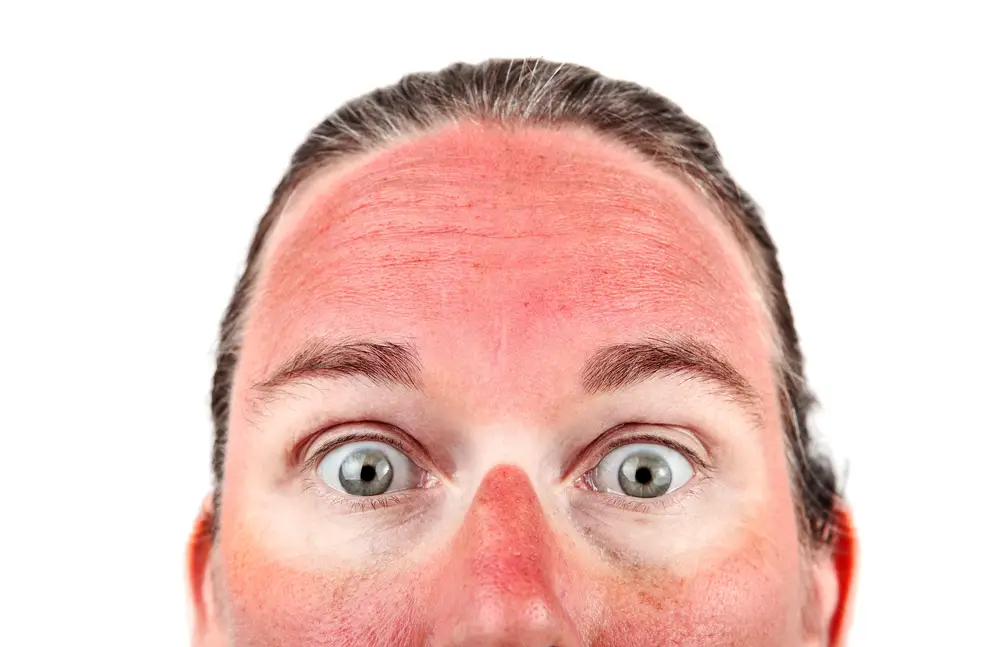
Skipping sunscreen is one of the worst things you can do for your skin. Sun exposure accelerates aging, causes dark spots, and increases your risk of skin cancer, says Dr. Carole Hazan, cosmetic dermatologist and skin surgeon. Even on cloudy days or indoors, UV rays can penetrate windows and cause damage. Applying SPF 50 daily protects your skin from these harmful effects and helps maintain a youthful appearance. Neglecting this step can undo all the hard work you put into your skincare routine.
Make sunscreen a non-negotiable part of your morning routine. Choose a lightweight, broad-spectrum formula that suits your skin type, and reapply throughout the day if you’re spending time outside. Many moisturizers and foundations now come with built-in SPF, making it easier to stay protected. Don’t forget often-overlooked areas like your neck, ears, and hands, which are just as vulnerable to sun damage. Consistent SPF use is your best defense against aging and sun-related skin issues.
9. Applying Heavy Matte Foundation
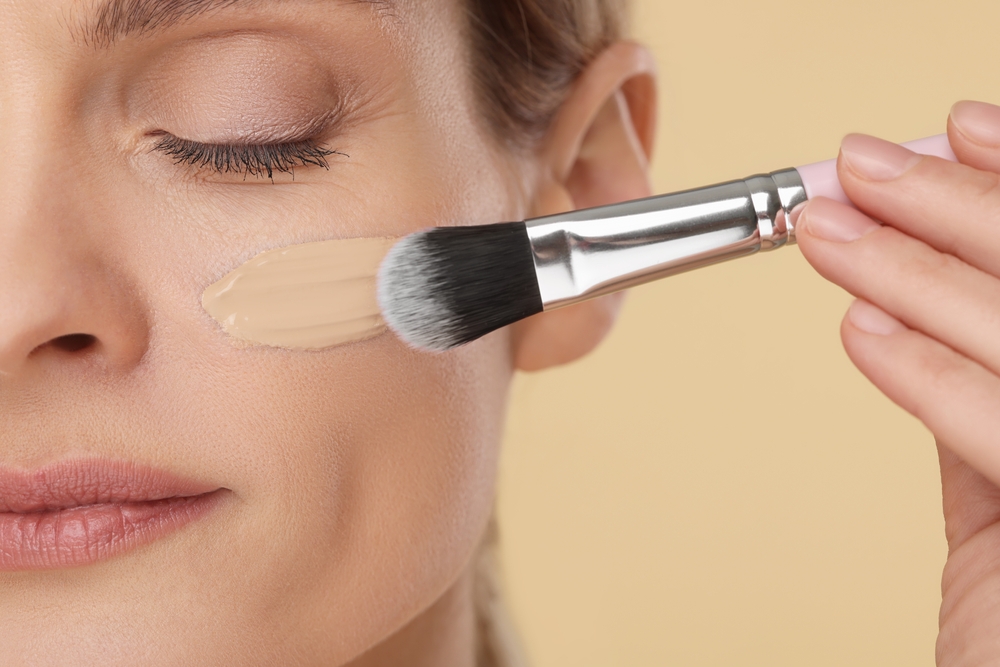
Matte foundation may promise flawless coverage, but it can also age your appearance when used improperly. Thick, heavy formulas settle into fine lines and wrinkles, making them more noticeable. They can also create a cakey, dry look that dulls your natural radiance. If your foundation shade doesn’t match your skin tone perfectly, it can look unnatural and emphasize imperfections. Instead of enhancing your features, heavy matte foundations often do the opposite.
Opt for lightweight, hydrating foundations or tinted moisturizers that provide coverage without sacrificing a dewy finish. Applying a primer before foundation helps create a smooth base and prevents makeup from settling into creases. Use a damp beauty sponge to blend for a more natural, skin-like finish. Avoid layering too much product, especially around areas prone to dryness or fine lines. A lighter, more natural approach to foundation can enhance your beauty rather than detract from it.
10. Abandoning Lip Care
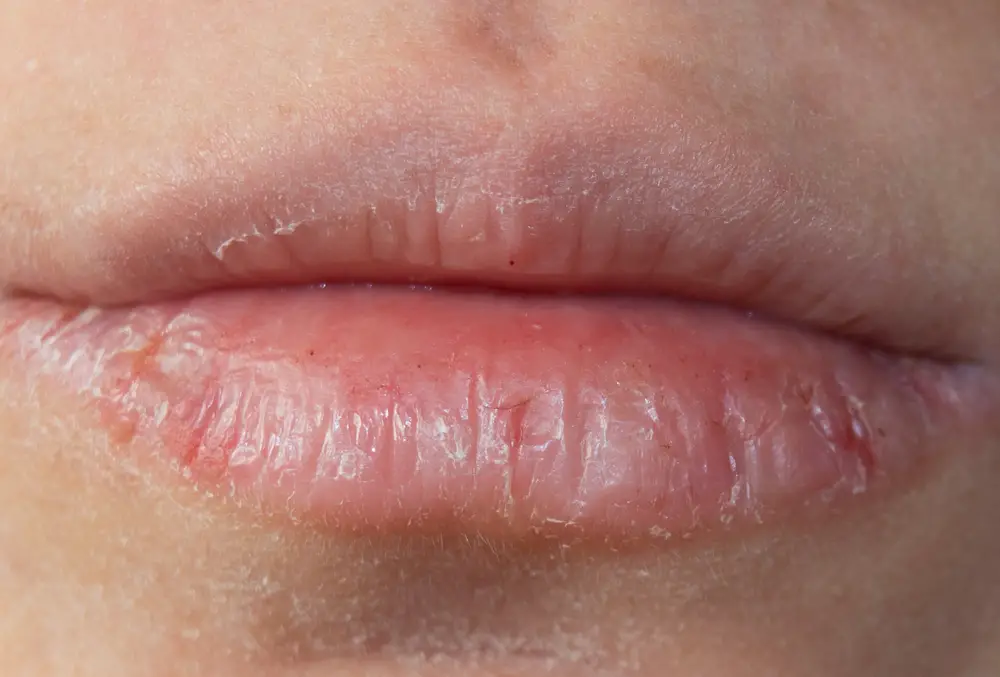
Lips are often overlooked in skincare routines, but they’re one of the first areas to show signs of neglect. Without proper care, lips become dry, chapped, and prone to fine lines. Environmental factors like sun exposure and dry air exacerbate these issues, making your lips look older. Applying an irritant-free, hydrating lip balm is essential to keep them soft and plump. Ignoring lip care not only affects their appearance but also makes lipstick application less smooth and flattering.
Incorporate lip care into your daily routine by exfoliating gently with a sugar scrub once a week. Use lip products with SPF to protect against sun damage, which accelerates aging. Choose hydrating lipsticks or glosses in shades that complement your skin tone, avoiding overly dark or matte formulas that can make lips look thinner. Consistent care keeps your lips soft, youthful, and kissably smooth.
11. Forgetting About Body Care
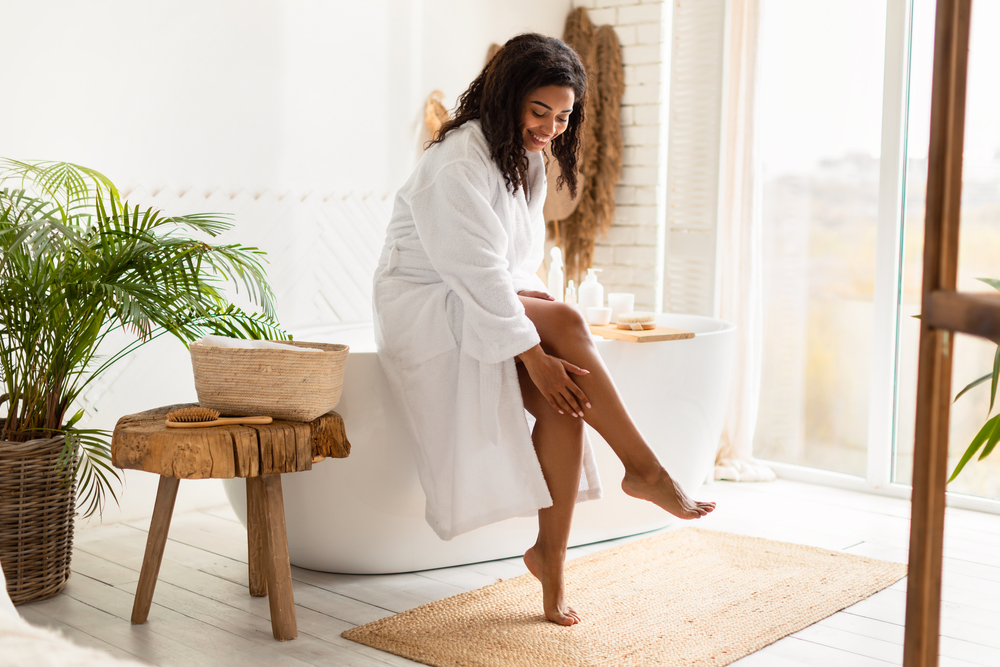
The skin on your body needs just as much care as your face, yet it’s often neglected. Dry, flaky skin can lead to premature aging, uneven texture, and loss of elasticity. Regular exfoliation with a dry brush or body scrub boosts circulation and removes dead skin cells. Following up with a nourishing moisturizer locks in hydration and keeps your skin smooth and firm. Neglecting body care can make even the most stylish outfits look less polished.
Treat your body to the same level of care you give your face. Look for body creams with ingredients like shea butter, hyaluronic acid, or ceramides for intense hydration. Pay extra attention to areas prone to dryness, such as elbows, knees, and heels. Incorporate body care into your post-shower routine for maximum benefits. Consistent effort will leave your skin glowing from head to toe.
12. Ignoring Hair Health

Hair health often takes a backseat, but neglecting it can make you look unpolished and older. Overwashing strips hair of natural oils, while infrequent washing leads to buildup and dullness. Using the wrong products for your hair type can exacerbate damage, making strands brittle and prone to breakage. Regular trims, deep conditioning treatments, and avoiding heat tools are crucial for maintaining healthy locks. Neglecting your hair’s health impacts not just how it looks but how you feel about your overall appearance.
Start by understanding your hair type and choosing products that cater to its specific needs. Use a gentle shampoo and conditioner, and incorporate a weekly mask for added nourishment. Avoid brushing wet hair, as it’s more prone to breakage—use a wide-tooth comb instead. Protect your hair from sun damage with UV-protectant sprays, especially during summer months. Healthy hair is a reflection of good self-care, enhancing your natural beauty.
13. Not Paying Attention To Grooming
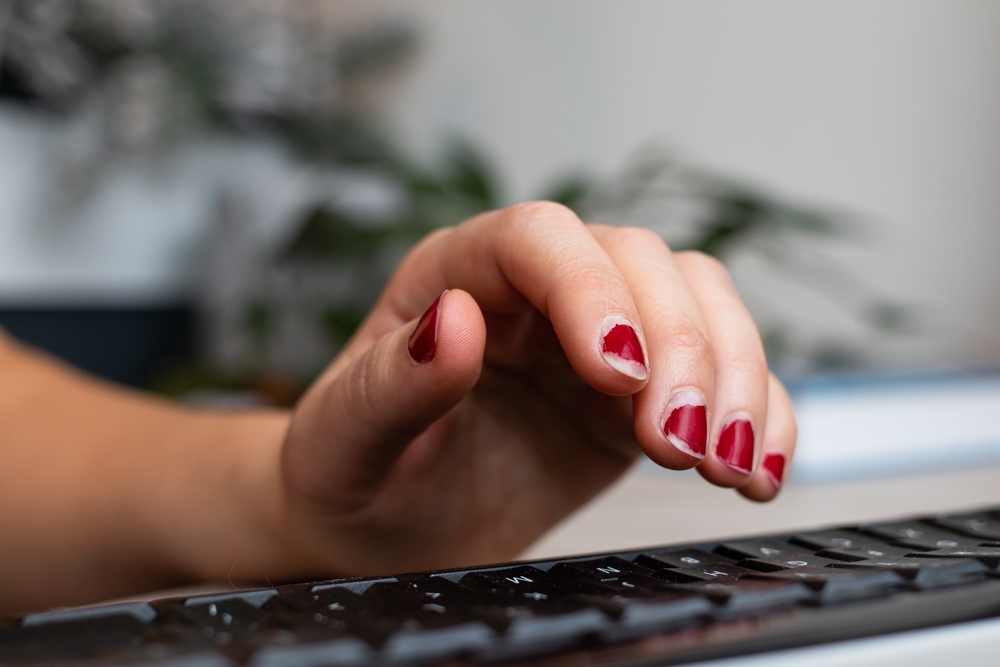
Small grooming details can make a big difference in your overall appearance. Neglecting basics like nail care, eyebrow maintenance, or facial hair removal can make you look unkempt. Dry, cracked hands or chipped nail polish can detract from an otherwise polished look. Grooming is about more than aesthetics—it also boosts confidence and makes you feel put-together. Regular upkeep ensures that you’re presenting your best self, no matter the occasion.
Make grooming a consistent part of your routine. Schedule regular manicures and pedicures or take time at home to care for your nails. Keep your eyebrows neat and shaped, as they frame your face and enhance your features. Hydrate your hands and feet with rich creams, especially during colder months when dryness is more common. Paying attention to these small details can elevate your look and make you feel more confident in your skin.
14. Overplucking Your Brows
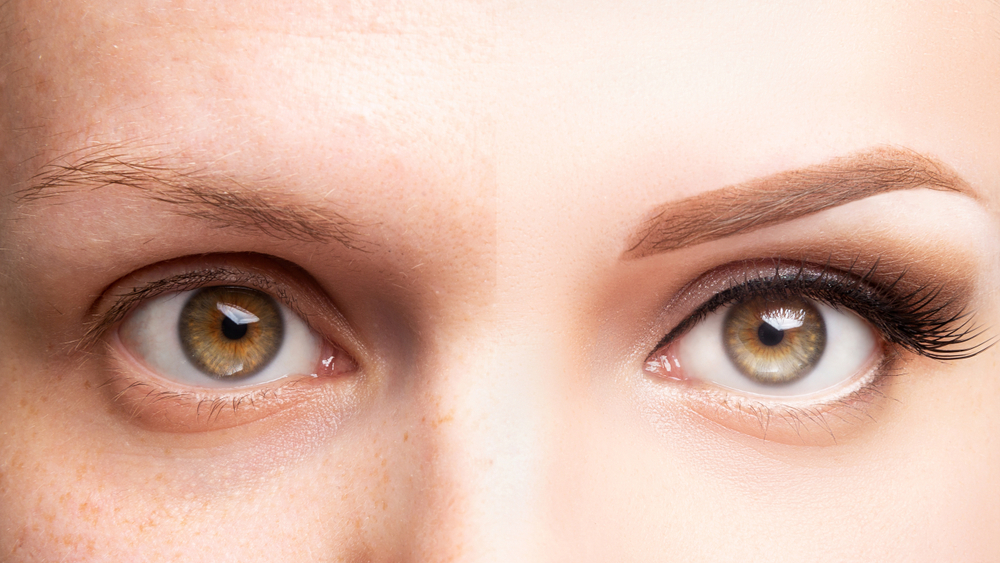
Eyebrows are one of the most defining features of your face, but overplucking can leave them sparse and uneven. Thin brows can make you look older and take a long time to grow back, sometimes not returning to their original fullness. While the 90s overplucked brow trend is long gone, many still struggle with finding the right balance in shaping their brows. Full, well-groomed brows frame your face and give a youthful, polished appearance. Leaving them too thin can detract from your overall look and even make your facial features seem less balanced.
If your brows are already sparse, there are solutions. Seek a professional brow technician for shaping or consider microblading to fill in gaps. For a more temporary fix, use a brow pencil or fiber-infused gel to add volume and definition. Avoid overdoing it when tweezing—stick to stray hairs outside your natural brow line. Healthy, full brows can instantly enhance your overall look, so give them the care they deserve.
15. Using Dirty Makeup Tools
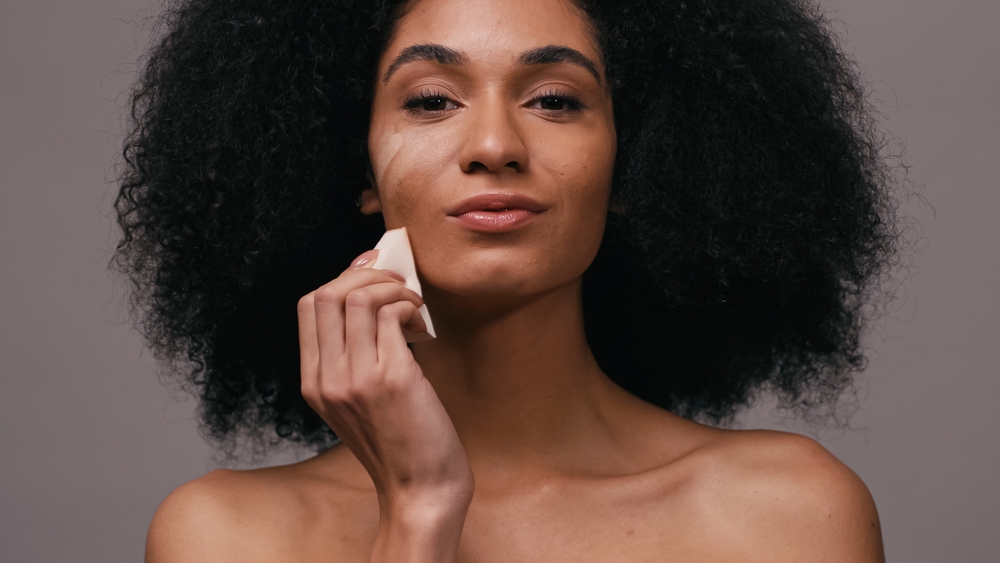
Dirty makeup tools are a breeding ground for bacteria, and using them regularly can wreak havoc on your skin. Sponges, brushes, and applicators collect oil, dirt, and makeup residue over time. When you use unclean tools, you transfer bacteria back to your face, leading to clogged pores, breakouts, and uneven texture. Skipping regular cleaning of your beauty tools can undo the effort you put into your skincare routine. Ensuring your tools are clean is essential for both hygiene and flawless makeup application.
Make it a habit to clean your brushes and sponges weekly using a gentle cleanser or brush cleaner. Rinse them thoroughly to remove all residue, and allow them to air dry completely before using them again. For daily touch-ups, consider investing in a brush cleaner spray to keep bacteria at bay between washes. Replace makeup sponges regularly, as they tend to hold more bacteria than brushes. Clean tools not only promote better skin health but also ensure smoother, more even makeup application.


